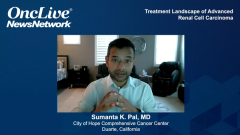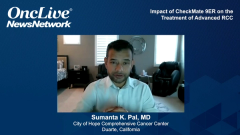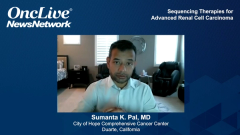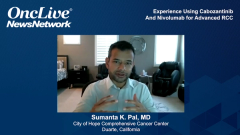
Experience Using Cabozantinib And Nivolumab for Advanced RCC
Toni Choueiri, MD: This combination will certainly be used. How much will it be when compared to the others? Some physicians and providers have their own biases and their own preferences. It’s a combination that has an overall survival and quality of life benefit. I was part of this study, so I have experience with the combination, and the trial mirrors my experience with our own patients. I have experience with nivolumab as a single-agent therapy and cabozantinib as a single-agent therapy, so I think this combination will be an important and much-needed addition in the fight against kidney cancer.
Sumanta K. Pal, MD: I've had the opportunity to use a number of cabozantinib-based combinations. I participated in Andrea Apolo, [MD,]’s trial looking at cabozantinib with nivolumab, and cabozantinib with nivolumab and ipilimumab: that triple regimen that's being evaluated in the COSMIC-313 trial. I've also had the opportunity to evaluate cabozantinib with atezolizumab in the context of COSMIC-021. That was a phase 1b clinical trial that initially focused on renal cell and bladder cancer. It’s now evolved to include prostate cancer and a multitude of other cohorts.
I've had relative ease in terms of administering the cabozantinib-based combinations. I don't see that there's substantial toxicity above and beyond what's seen with cabozantinib, nivolumab, or atezolizumab alone. The toxicities in my hands have been somewhat nonoverlapping.
There is also an art to giving all these tyrosine kinase inhibitors. There are those individuals who are quite familiar with giving axitinib, and some who are familiar with giving cabozantinib. As time has evolved and as people have gotten more comfortable giving cabozantinib, we have relative ease in terms of reducing the dose from 60 mg to 40 mg, from 40 mg to 20 mg, and to 20 mg every other day.
By employing these sorts of dose-reductions, you can ensure that patients are getting an adequate dose of a drug. Hopefully, that lends itself to a better response.
Toni Choueiri, MD: When you have 2 drugs that work, you want to build on them. You now have a third drug, ipilimumab, which is a CTLA-4 inhibitor that can be integrated in this cabozantinib/nivolumab combination. Whether this happens in the beginning or how, it builds on the fact that these are the drugs you want to use. We want to push the survival envelope, the survival benefit, further and further.
Sumanta K. Pal, MD: One challenge that we’re going to face with the combination of cabozantinib and nivolumab with axitinib and pembrolizumab, as with all the frontline combinations as they become approved, is that it's going to be challenging to ascertain with such a high watermark what other comparators might be in forthcoming trials. Does cabozantinib/nivolumab become the standard? I suppose it probably does. We're going to have to address that question in the coming years, but [cabozantinib/nivolumab] set such a high bar with a PFS [progression free survival] of 19 months by independent investigator review that it's going to be challenging to beat.
We have to start setting our sights on potential second-line therapies. I've been working on some novel agents, including cellular therapies for renal cell carcinoma with the company CRISPR Therapeutics. I've been quite excited about the developments regarding MK-6482, which is the HIF-2 [hypoxia-inducible factor 2] alpha inhibitor. There are multiple other HIF-2 inhibitors coming to market soon. All of these are going to play some sort of role in terms of defining the second-line landscape and beyond.
Transcript Edited for Clarity










































